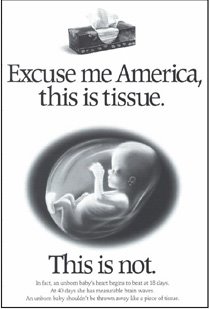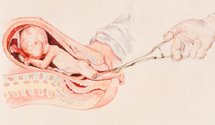The Truth Shall Set You Free?
At the crossroads of
She presents her viewpoint [classically “poor-choice”] on the ethical dilemma recently posed by the health concerns of
Her words appear in their entirety below, along with commentary in brackets and in orange font.
The truth shall set you free?
Audrey Manning
The Beacon
The first case of sextuplets born in
The
The care of the babies presents an ethical dilemma for the doctors. Medical authorities do not generally have the authority to overrule the parents’ wishes. However, when a child is in danger of dying, the doctors can lodge a complaint with government authorities that can get a court order to enforce treatment.
[Yes, when a child is in danger of dying, would to God that doctors lodged complaints rather than referring women for ‘termination” of the “products of conception.”]
Religious authorities cite the special relationship between parent and child as something to be fostered and protected because it is the fundamental elemental upon which society and culture is constructed. The big question is: should the state intervene to save the life of a child?
[Yes, an excellent question. The woman who is carrying a child is in that same parent/child relationship. Are you willing to ask and debate the question of the state’s intervention in that case as well? Should the state intervene to save the life of a child threatened by abortion?
[Nice try. I wonder which “religious authorities” you are referring to. Granted, you do raise a point because there is a principle at stake. I’m glad you infer a principle and I assume the principle you are concerned with is that innocent life ought always to be defended and preserved, even if the perpetrators happen to be parents.
It should be plainly obvious that is the principle to which pro-lifers have committed themselves. Are you arguing now for the pro-life position? Your “conundrum” certainly does reflect the current schizophrenia in
But as we shall see a little later in the column, Audrey Manning is not fighting for this principle. That is not her argument at all. She introduces this protest purely to paint pro-lifers as inconsistent, illogical and disingenuous.]
The Evangelical Fellowship of Canada cites three main principles at stake — the rights of parents, respect for religious beliefs and protection of children. In the unborn debate, protection of the unborn is paramount. After the child is born, protection comes after parental and religious rights.
There is an ethical assumption parents should have care and custody of their children because parents love their children and strive to help them to become honourable human beings. [Only in an ethical society can this be realistically assumed.] This assumption does not stand up to scrutiny. If parents are abusing children, society intervenes to protect the children. [Wrong. That is precisely what pro-lifers are fighting for in
The argument is reduced to: are children individuals with human rights? [Apparently not all children, Ms. Manning, certainly not in
[There you have the summary. This is the statement which should have introduced this opinion column. Life-and-death decisions regarding children should not take into consideration the religious beliefs of the parents. I thought that in
All those who would strip
Parents have rights, but they are not absolute. [What are absolute rights and from where do they originate, Ms. Manning?] Outside religious rules, parents can’t make decisions that have the potential to harm their children. Children are regularly taken away from their parents when they’re deemed to be at risk. Thus, while society may accept parents are free to become martyrs, they are not free, in indistinguishable circumstances, to make martyrs of their children.
[Your argument here begs the question of why then would we currently permit in
That parental rights [what of the mother’s “right to choose?”] do not give parents life and death authority over their children is especially relevant in the case of Jehovah’s Witnesses. This is because their teachings have changed radically, over the years, with regard to medical treatment.
[And now comes Manning’s tirade intended to calumniate religious “extremists,” i.e. all those whose religious convictions count for more than insignificant decisions in their lives, e.g. in this case Jehovah’s Witnesses, but also I assume practicing Catholics, evangelical and fundamentalist Christians, etc. etc.]
As well as whole blood, the Watchtower Society used to prohibit taking into the body any of the components that make up whole blood. Over time, while sticking to the banning of whole blood, they have gradually permitted the use of virtually all the components that make up whole blood.
They first sanctioned globulin, then the clotting factors, plasma proteins and finally hemoglobin in June 2000. According to the Watchtower, June 15, 2000, Questions From Readers, essentially every component or fraction derived from whole blood and its primary components are allowed in medical treatment.
Religious authorities often view new technologies with suspicion. Throughout the 1940s and 1950s many religious communities objected to vaccinations. Vaccinations were denounced as harmful and morally wrong. Jehovah’s Witnesses saw vaccination as a direct violation of the everlasting covenant that God made with Noah after the flood (the Golden Age, precursor to the Awake, Feb. 4, 1931).
[It would appear that Ms. Manning is not only an expert in religious and ethical affairs but also in the field of medicine. Many people still make very good medical arguments for forgoing vaccinations!]
Between 1967 and 1980, the Watchtower Society and others held a dim view of organ transplants. Major religions, including Catholicism, Judaism and Islam, issued warnings against transplants. Some religions objected because the procedure involved cutting an organ from a living body. Others, like the Witnesses, viewed transplants as an extension of cannibalism (the Watchtower, Nov. 15, 1967).
In 1980, the Watchtower Society made transplants a matter for personal decision, accepting the procedure as one that saves lives. Until the rules were relaxed, loyal Witnesses chose blindness rather than a corneal transplant and death rather than a kidney transplant.
[Regardless of how we might view this particular practice of a religious group, I find it refreshing that there are still religious groups who place obedience to God, an obedience that costs great loss in temporal rewards, on a much higher priority level because they possess a determined faith that first seeks eternal rewards.]
Some branches of the Jewish and Muslim faiths continue to voice concerns over the rapid advance of medical research. However, religious thinkers have been forced to consider scientific technology when dealing with theological issues. Questions relating to stem-cell research, fertility, contraception and abortion remain the focus of religious debates.
[And considering that these are all issues touching deeply on human life and the family, they will continue to be dominated by concerns of morality in addition to medical and scientific considerations.]
There is no doubt society is conflicted over religious truths. Yet, even the most dogmatic views evolve [even “absolute” rights?]. Is it reasonable to place the lives of children into this mix of personal beliefs and truths? [Yes, absolutely! They currently pay daily with their lives in
Excellent question and pro-lifers encourage such a debate. The sooner


























0 Comments:
Post a Comment
<< Home